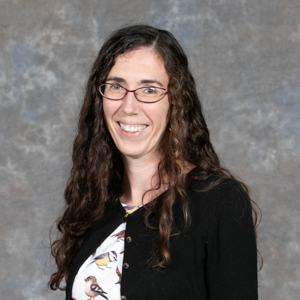 Ask Lander University Associate Professor of Biology Dr. Emily Prince to talk about her philosophy of teaching, and she has a succinct answer.
Ask Lander University Associate Professor of Biology Dr. Emily Prince to talk about her philosophy of teaching, and she has a succinct answer.
“Some people think that they learn best from listening, and some people think that they learn best from reading, but I think everybody learns best from doing,” she says.
Prince’s emphasis on active learning, and the student successes associated with it, were important reasons why she was selected as Lander’s Distinguished Professor of the Year.
Another was the leading role she played in revising Lander’s biology curriculum, turning the introductory course into a two-semester course and gearing it more toward hands-on learning.
“We wanted everybody to have a foundation in just the basics of biology, so we stretched it to two semesters, so we could slow down and practice with doing the things more,” she said.
Other changes to the program made it easier for biology majors to “tailor their curriculum to be a little bit better suited for what they are particularly interested in, so if you want to go to med school, then you’ll take classes that are more related to humans, and if you want to be a wildlife biologist, then you’ll take the classes that are more focused on ecosystems or animal physiology or things like that.”
The changes, implemented in 2017, have resulted in “improved student success in freshman biology, success in upper-level biology courses, and graduation rates. In fact, these things have all significantly improved, especially for marginalized student groups.”
Prince, a native of Covington, Georgia, describes herself as “an environmentalist from a young age. I wanted to live a life that was meaningful in that way, to try and make the planet better, and try and sort of get us on the right track.”
As an undergraduate at King College, in Bristol, Tennessee, she majored in cell and molecular biology.
“I don’t know why, I think it was just hard, and I liked to do things that were hard,” she said.
She changed course at Georgia Tech, earning a Ph.D in chemical ecology in 2008.
“I wanted to look at big things,” she said. “I wanted to understand the big picture.”
Before arriving at Lander in 2015, she taught for two years at Friedrich Schiller Universitat in Jena, Germany, and for five years in Augusta, Georgia, with stints at Paine College and Georgia Regents University.
Prince has studied both freshwater and marine ecosystems, and part of what attracted her to Lander was the fact that it offered classes in limnology.
“That’s a unique class that Lander offers that most undergraduate schools don’t,” she said.
Another thing that worked in Lander’s favor was the fact that her husband, Professor of Music Dr. Robert Kelley, was already teaching here.
Prince is the first author on a paper that she, Kelley and Senior Lecturer of Biology Lisa McDonald have submitted to the journal “Teaching Issues in Ecology and Evolution,” which grew out of their camera trap observations of mammal activity patterns. She is interested in the effects of human disturbance on wildlife, and recently received a president’s grant to study how animals react to artificial light.
Prince makes a point of including undergraduates in her research. Several of the students advised by her and McDonald have presented their work at local, state, regional, or national scientific conferences, including Sam Williams, of Greenville, who beat graduate students to win the Best Animal biology poster at the Association of Southeastern Biologists meeting this year, and Zach Swartzentruber, of Abbeville, who finished second in the Ecology and Evolution section of the National TriBeta Conference last year, beating out students from all over the country. Another student, Elisa Howansky, of Westminster, is preparing a scholarly paper for submission to a peer-reviewed journal.
Prince’s former research students have gone on to graduate school, medical school, physical therapy school and veterinary school, with others finding work in the field.
“We have a lot of really dedicated, serious students,” she said.
But she enjoys time spent with underclassmen, too.
“I like teaching freshmen, because they’re so excited, and I feel like how they do in their first class is going to set them up for the rest of their college career. It’s exciting if they can do well. A lot of times they come in and they’re so overwhelmed and shellshocked after the first exam, and to try and help those students get with it and figure out how to succeed in college, I really like that, I think it’s fun.”
Since beginning work at Lander, Prince has participated vigorously in the activities of the faculty senate, serving a year as parliamentarian and five more as an at-large senator, serving also as secretary of the senate. Due to a mid-year resignation, she was elected to finish the 2022-2023 academic year as chair elect, and is currently conducting elections to fill several vacant senate seats. During the upcoming school year, she will serve as senate chair.
“Hopefully I can find areas where the faculty and administration want the same thing, and we can work on getting some things accomplished that will help everybody,” she said.
In the coming year, she hopes to also resume her investigation of the microbacterial communities in the Saluda watershed, which includes Lake Greenwood. She is especially interested in the potential for toxin production of a harmful algal bloom-forming cyanobacterium that exists there.
As always during the summer, she is also working on the classes she will teach in the fall.
“I try and make small changes to all my courses every year, and try to think about what has worked and what hasn’t worked,” she said.
She anticipates a semester in which there will be plenty to do.
“It’s going to be a busy year,” she said.